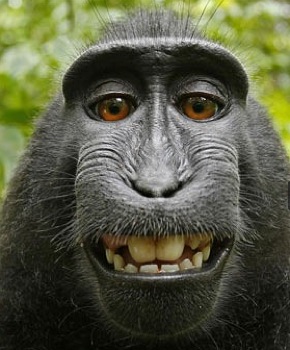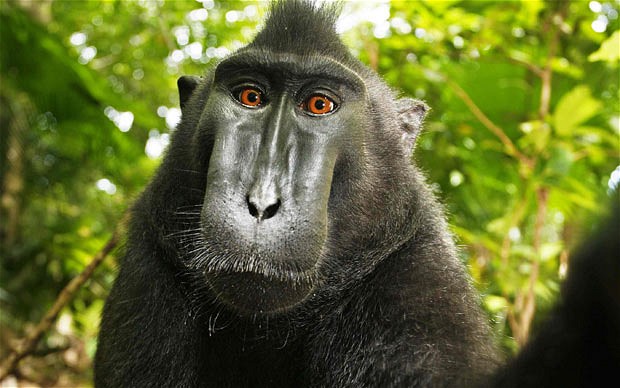Animal rights activists represent the interests of a macaque in court, which made a self-portrait but did not receive copyright
 Maybe someone remembers the scandalous story of 2011 related to intellectual property issues. Lawyers, human rights activists, activists for freedom of information and the entire sympathetic blogosphere joined in the discussion of that case.
Maybe someone remembers the scandalous story of 2011 related to intellectual property issues. Lawyers, human rights activists, activists for freedom of information and the entire sympathetic blogosphere joined in the discussion of that case. The point is this: in the summer of 2011, one crested macaque in Indonesia made a self portrait with a digital camera. She found the camera, aimed it at herself and began to indulge (the macaque liked the sound that the apparatus made when the shutter button was pressed). The problem is that experts could not immediately figure out who owns the copyright for this self-portrait.
The problem is not at all illusory. Owners of several blogs and media received from Caters News Agencythe requirement to remove photos from the Internet , because this agency allegedly owns exclusive rights to distribute them .
Macaque took several hundred shots until she was fed up with the toy, but most of the photos were out of focus. Here is another of the photos that led to the legal proceedings:

Six years ago, we already examined in detail this legal incident.
The Civil Code of the Russian Federation ( Article 1228 ) enshrines the following definition:
1. The citizen is recognized as the author of the result of intellectual activity, whose creative work created such a result.
Citizens who have not made a personal creative contribution to the creation of such a result, including providing its author only with technical, consulting, organizational or material assistance or assistance, or that only contributed to the registration of rights to such a result or facilitated its use, are also not recognized as authors of the result of intellectual activity, as well as exercising control over the implementation of the relevant work.
As we see, even the photographer who owns the camera (that is, who provided technical and material assistance) cannot be recognized as the author of the work. Similarly, if you gave a passer-by a camera with a request to take a picture of yourself, then you do not have the right to this photo, you do not have the right to publish and distribute it without the permission of the author.
American copyright law is similar to Russian. Now, if the photographer installed the camera, set focus and only allowed the monkey to press the button, then the photographer would have the opportunity to claim authorship. But here is another case: the owner of the camera himself admitted that he had lost the camera in the forest before the monkey found it.
Who then is the copyright holder, to which the right to distribute has passed from the author? Six years ago, Techdirt bloggers suggested by default all photos taken by monkeys to be considered public domain . Maybe it would be so, but not everyone agrees with this outcome.
Activists of the People for Ethical Animal Treatment (PETA) filed an appeal with the United States Court of Appeals for the ninth round. PETA lawyers set out the position that “behind the free-living crested macaque Naruto [yes, the monkey already has its own name - approx. ed.] copyright should be approvedin the photograph under the US Copyright Act. ” Lawyers explain that in this case, Naruto saw her reflection in the camera lens, understood the relationship between pressing the shutter button and changing the reflection - and made different facial expressions by pressing the shutter button.
The case has already passed through several instances , and in each case PETA lost. The final verdict was issued by the district judge in January 2016 : he ruled that the competence to vest monkeys with copyright belongs to Congress and the president, and he does not have such authority. Earlier in 2014, the US Copyright Office also stated that works "produced by nature, animals or plants" cannot be protected by copyright.
But PETA lawyers insist that it is Naruto who must own the copyright to the images. If the court agrees with this, this will be the first time that any animal will receive the right to own any property (intellectual), and will not be considered property itself, which PETA categorically opposes. Their motto is: "Animals do not belong to us."

“When science and technology move forward, laws adapt to them,” says PETA Chief Lawyer Jeffrey Kerr. “Nothing in the Copyright Act restricts ownership depending on the type of living creature, and PETA asks to interpret the act in light of the current scientific consensus that monkey macaques are capable of creating original works.”
In fact, these photographs fully claim the title of “original works” and from some point of view even works of art. In the end, after all, paintings painted by chimpanzees are exhibited in galleries and sold to collectors - these are also valuable creative works, so why are photographs worse?
The Court of Appeal of the three judges will begin the trial today, July 12, 2017.
All royalties for photographs, if the case is won, will belong to Naruto and his community, PETA said. I wonder how the crested macaques in Indonesia will manage the money received? Since copyright has been preserved for decades, Naruto and his descendants can afford a luxurious life. For example, they can pay for the work of people who will look after them. That would be fun.
